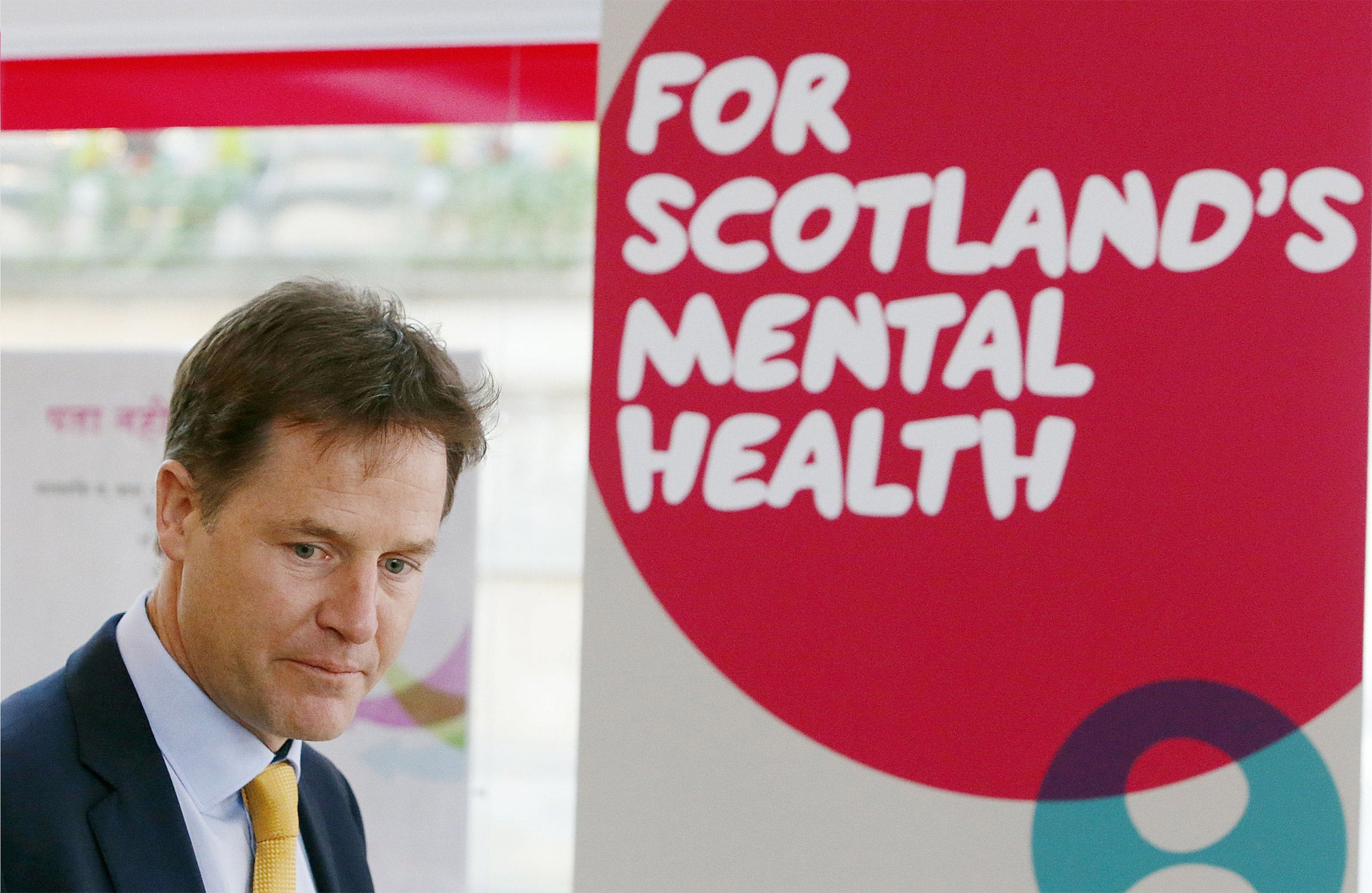Lib Dem Conference: Nick Clegg pledges to end the shortfall in mental health treatment
Extra £120m will be invested in five-year plan to banish its ‘Cinderella’ status

Your support helps us to tell the story
From reproductive rights to climate change to Big Tech, The Independent is on the ground when the story is developing. Whether it's investigating the financials of Elon Musk's pro-Trump PAC or producing our latest documentary, 'The A Word', which shines a light on the American women fighting for reproductive rights, we know how important it is to parse out the facts from the messaging.
At such a critical moment in US history, we need reporters on the ground. Your donation allows us to keep sending journalists to speak to both sides of the story.
The Independent is trusted by Americans across the entire political spectrum. And unlike many other quality news outlets, we choose not to lock Americans out of our reporting and analysis with paywalls. We believe quality journalism should be available to everyone, paid for by those who can afford it.
Your support makes all the difference.Waiting time targets for mental health treatment will be introduced in England next April under a landmark move to finally give it the same priority as physical health.
Nick Clegg will announce today that an extra £120m will be invested in mental health under a five-year plan to end its “Cinderella” status in the NHS. At present, one in 10 sufferers waits a year for “talking therapy”.
From April, three quarters of people referred for problems such as depression and anxiety will start their treatment within six weeks, and 95 per cent will start within 18 weeks. Half the people going through their first episode of psychosis will get help within two weeks.
In his closing speech to the Liberal Democrat conference in Glasgow, Mr Clegg will say that his party would go much further if it remained in power after next May’s election. It would raise taxes on the better-off to inject another £500m into mental health, allowing waiting time targets to be introduced for conditions such as eating disorders and bipolar disease.
The Lib Dems will put their commitment to mental health on the front page of their election manifesto, making it a non-negotiable “red line” in any coalition talks with the Conservatives or Labour.
“Let’s be the first party to give mental health the status it deserves,” Mr Clegg will tell Lib Dem delegates. His party would “end the discrimination against mental health for good”.
Last night the Deputy Prime Minister said the extra money for mental health in the next parliament would be paid for partly by raising the rate of capital gains tax from 28 per cent to between 35 and 40 per cent for taxpayers on the 40p higher rate. The amount of capital gains exempt from CGT would be cut from £10,900 to £2,500 a year.
Mr Clegg accused the Tories of “plagiarising” the Lib Dem plan after they said they would also raise the personal tax allowance from £10,000 to £12,500 a year by 2020. He tried to outflank David Cameron by setting out a timetable and saying how the Lib Dems’ tax cuts would be funded. He pledged that the allowance would rise to £11,000 in April 2016 if the Lib Dems were in office, meaning a £100 tax cut for 29m people.
He rejected Tory plans to help middle-income earners by raising the threshold at which the 40p rate starts to bite. Instead, the Lib Dems would raise the income level at which workers start to pay national insurance, helping those earning about £8,000 a year. Eventually, that level would be aligned with the personal allowance. But the move might have to wait until after 2020 because the Lib Dems’ first priority would be a £12,500 tax allowance.
Mental illness affects one in four people during their life, costs the country an estimated £100bn a year and causes 70m working days to be lost.
The Lib Dem leader, who has long had a personal passion for the issue, will describe how he was moved by a group of “brave” young mental health sufferers he met this year.
“The despair, the shame, the bullying, the parents and siblings who didn’t know how to cope with them. And for some, the very darkest thoughts imaginable, including attempts to take their own lives,” he will say. “If they can speak to me, I can speak up for them.”
Pressure groups welcomed his move but will watch closely to see whether there are enough professionals to meet the new targets. Paul Farmer, chief executive at Mind, said: “We now need to see these important ambitions translate into tangible improvements for everyone trying to access the help they need.”
Join our commenting forum
Join thought-provoking conversations, follow other Independent readers and see their replies
Comments